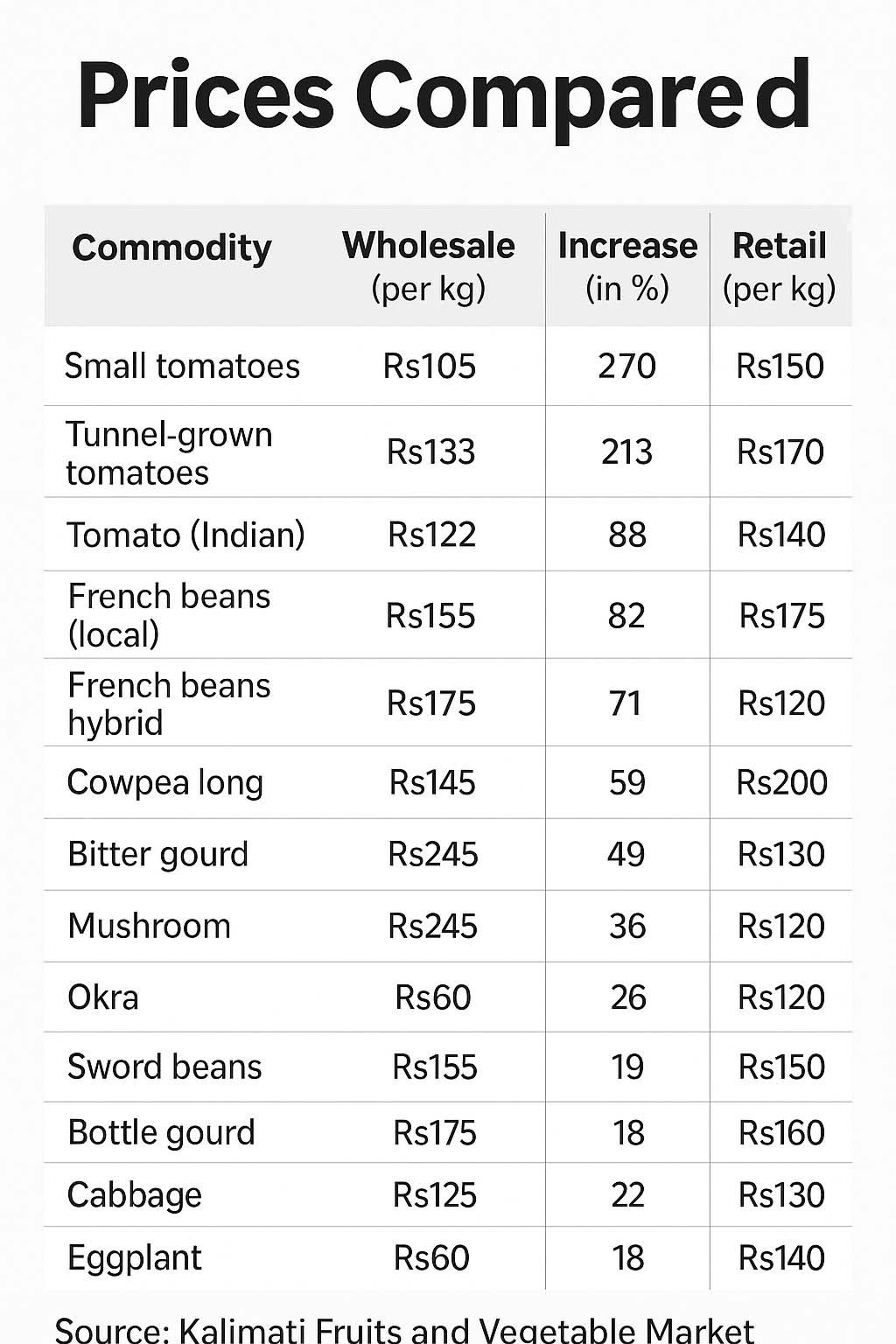Money
Veggie prices soar 200 percent on weddings, crop delays
Official inflation data fails to capture quick price swings hitting consumers hard.
Post Report
Vegetable prices, which have been climbing steadily since August, show no signs of easing—even as the country enters what is typically the season of abundant fresh produce.
The sustained surge has pushed wholesale and retail rates up by more than 200 percent in Nepal’s biggest vegetable hub, the Kalimati Fruits and Vegetable Market, deepening concerns for consumers already grappling with rising living costs.
Traders say the current spike stems from a sharp drop in production and heavier-than-usual demand, particularly driven by the ongoing wedding season.
In the past month alone, the wholesale price of tomatoes—the most volatile commodity in recent weeks—has jumped by an astonishing 269.72 percent, reaching Rs105 per kg.
“We are receiving only 30 to 40 tonnes of tomatoes daily, compared to 60 to 70 tonnes during normal times,” said Binaya Shrestha, information officer at the Kalimati market. “Production has declined, and demand pressure from weddings has escalated the prices of nearly all seasonal vegetables.”
Compounding the problem, tomatoes from the Tarai have not yet arrived, and tunnel-farmed tomatoes from the Kathmandu Valley and surrounding districts are also delayed.
Traders attribute the setback to the late arrival of winter crops.

Unseasonal rainfall disrupted planting schedules earlier this year, delaying sowing, which usually begins in July, until September. As a result, winter vegetables have yet to reach the market in the expected volumes.
“The seasonal vegetables are simply taking longer to arrive,” Shrestha said. “It may take additional weeks for prices to stabilise.”
The price surge in markets contrasts sharply with Nepal Rastra Bank’s recent inflation report, which shows vegetable prices declining by 15.63 percent in mid-October, pulling down the overall consumer inflation to 1.47 percent, the lowest in two decades.
Traders say the discrepancy reflects rapid month-to-month fluctuations that the banking data may not fully capture.
Almost all major vegetables have seen steep month-on-month increases in both wholesale and retail prices.
Tomato (Indian) in wholesale markets has risen by 87.69 percent to Rs122 per kg, retailing at Rs130-140. Local small tomatoes have surged by 269.72 percent to Rs105 per kg wholesale, selling at Rs140–150 in retail outlets.
Tunnel-grown tomatoes have climbed by 212.94 percent to Rs133 per kg.
Carrots now cost Rs145 per kg wholesale after a 16 percent rise.
Seasonal cabbage price has increased by 19.05 percent to Rs125 per kg. Eggplant prices have risen 18.18 percent to Rs65 per kg wholesale and up to Rs110-120 at retail.
Cowpea (long) is selling at Rs175 per kg after a 59.09 percent spike.
French beans (local) have surged by 82.35 percent to Rs155 per kg, while the hybrid variety has increased by 70.59 percent to Rs145.
Sword beans are up by 26.09 percent to Rs145.
Bitter gourd prices have jumped by 52.63 percent to Rs145 wholesale, reaching Rs210–220 retail. Bottle gourd is up 20 percent to Rs60 wholesale and Rs130–140 in retail shops. Smooth gourd has risen by 60 percent to Rs120 per kg.
Squash round prices have climbed 9.09 percent to Rs60. Okra has increased by 35.29 percent to Rs115 and sells at Rs170–180 in retail markets.
Mushroom (kanne) has surged by 48.48 percent to Rs245 wholesale and nearly Rs300 retail. Broccoli prices, though less volatile, have still increased by 3.45 percent to Rs150 wholesale and Rs240–250 retail.
As the planting delays ripple through the supply chain, traders warn that consumers may face continued price pressure until winter crops reach full production.




 14.12°C Kathmandu
14.12°C Kathmandu












